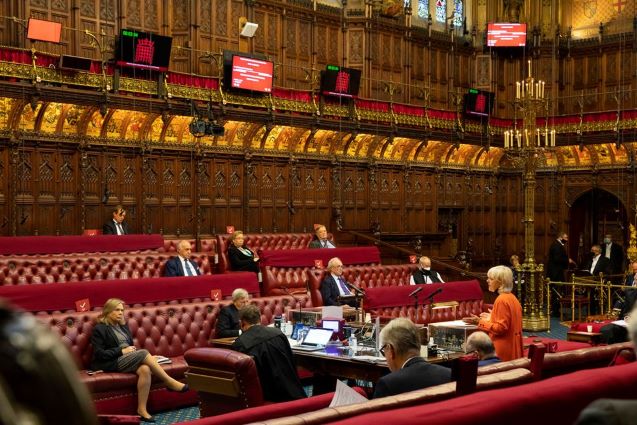British lawmakers passed a motion calling for an “immediate humanitarian cease-fire” in the Gaza Strip after a historic disorder in the House of Commons on Wednesday.
The Scottish National Party (SNP) motion passed as amended without a vote with majority of MPs screaming “aye” after it was amended by a Labour motion that changed the wording from an “immediate ceasefire.”
The total chaos ensued after Speaker Lindsay Hoyle accepted amendments by both the Conservative and Labour parties to the SNP motion, calling for an “immediate cease-fire,” an unprecedented move according to parliament traditions.
The situation worsened when Tory and SNP MPs walked out of the House of Commons in protest, and the Conservatives withdrew their amendment, saying they would not like to participate in today’s proceedings.
“Regrettably, Mr Speaker has inserted himself into the row and undermined the confidence of this House in being able to rely on its long-established standing orders to govern its debates,” Leader of the House Penny Mordaunt said.
The lawmakers later rejected to sit in private for the vote on the Labour amendment and the SNP motion. The Labour amendment, which changed the wording from “immediate cease-fire” to “immediate humanitarian cease-fire,” passed in a quick vote, before the amended SNP motion also passed in the same fashion, with MPs shouting “aye” and “no.”
‘British politics at its lowest’
Palestinian Ambassador Husam Zomlot described the chaos as “British politics at its lowest.”
“To see this chaos in the House of Commons, it is really British politics at its lowest,” Zomlot said on Channel 4 News.
“This is disgraceful and shameful… after 100,000 Palestinians killed, maimed, injured,” he said, accusing British MPs of protecting their careers, instead of protecting civilians in Gaza.
Speaker’s future unknown
A shaken Lindsay Hoyle later returned to the House of Commons, apologizing for his amendment choice, explaining that he only intended all MPs’ views to be heard in parliament. He said he regretted his decision, but he did it for the safety of MPs as they received threats from constituents on how they would vote on Gaza.
“I’ve got to say, I regret how it ended up. It was not my intention,” Hoyle said.
“I wanted all to ensure they could express their views and all sides of the House could vote.”
SNP leader in Westminster Stephen Flynn said Hoyle’s position is “entirely intolerable.”
“I am afraid that is treating myself and my colleagues in the SNP with complete and utter contempt.”
“Your position in intolerable,” Flynn told Hoyle.
The opposition day motions are traditionally opposed by a counter-motion or amendment from the government party but not another opposition party.
Government’s position
The withdrawn Tory amendment was to change the wording of the SNP motion to “immediate humanitarian pause.”
British government has insistently refrained from calling for a cease-fire since Oct. 7.
Earlier on Wednesday, Prime Minister Rishi Sunak failed once again to back a call for an immediate cease-fire in Gaza in the House of Commons.
Echoing the government, Labour Leader Keir Starmer insisted that “Israel has right to defend itself,” in the first months of the conflict but recently changed his tune to say a humanitarian cease-fire was needed in Gaza. With Labour amendment passed on Wednesday, Starmer managed to avoid a rebellion from his MPs, because up to 100 MPs were ready to vote for the SNP motion, according to sources.__The Nation





